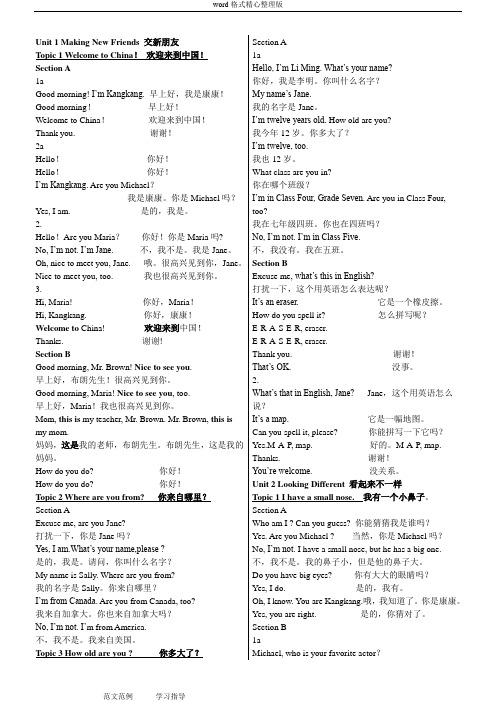仁爱版英语七年级上册课文及翻译图文稿
(完整版)2017新版仁爱版七年级(上册)英语课文翻译

Unit 1 Making New Friends 交新朋友Topic 1 Welcome to China!欢迎来到中国!Section A1aGood morning! I’m Kangkang.早上好,我是康康!Good morning!早上好!Welcome to China!欢迎来到中国!Thank you. 谢谢!2aHello!你好!Hello!你好!I’m Kangkang. Are you Michael?我是康康。
你是Michael吗?Yes, I am. 是的,我是。
2.Hello!Are you Maria?你好!你是Maria吗? No, I’m not. I’m Jane. 不,我不是。
我是Jane。
Oh, nice to meet you, Jane. 哦。
很高兴见到你,Jane。
Nice to meet you, too. 我也很高兴见到你。
3.Hi, Maria! 你好,Maria!Hi, Kangkang. 你好,康康!Welcome to China! 欢迎来到中国!Thanks. 谢谢!Section BGood morning, Mr. Brown! Nice to see you.早上好,布朗先生!很高兴见到你。
Good morning, Maria! Nice to see you, too.早上好,Maria!我也很高兴见到你。
Mom, this is my teacher, Mr. Brown. Mr. Brown, this is my mom.妈妈,这是我的老师,布朗先生。
布朗先生,这是我的妈妈。
How do you do? 你好!How do you do? 你好!Topic 2 Where are you from? 你来自哪里?Section AExcuse me, are you Jane?打扰一下,你是Jane吗?Yes, I am.What’s your name,please ?是的,我是。
仁爱版七年级上册英语课文翻译

Unit 1 Making New Friends 交新朋友Topic 1 Welcome to China ! 欢迎来到中国! Section A 1a Good morning! I’m Kangkang. 早上好,我是康康! Good morning ! 早上好! Welcome to China ! 欢迎来到中国! Thank you. 谢谢! 2a Hello ! 你好! Hello ! 你好! I’m Kangkang. Are you Michael 我是康康。
你是Michael 吗 Yes, I am. 是的,我是。
2. Hello !Are you Maria 你好!你是Maria 吗? No, I’m not. I’m Jane. 不,我不是。
我是Jane 。
Oh, nice to meet you, Jane. 哦。
很高兴见到你,Jane 。
Nice to meet you, too. 我也很高兴见到你。
3. Hi, Maria! 你好,Maria ! Hi, Kangkang. 你好,康康! Welcome to China! 欢迎来到中国! Thanks. 谢谢! Section B Good morning, Mr. Brown! Nice to see you . 早上好,布朗先生!很高兴见到你。
Good morning, Maria! Nice to see you , too. 早上好,Maria !我也很高兴见到你。
Mom, this is my teacher, Mr. Brown. Mr. Brown, this is my mom. 妈妈,这是我的老师,布朗先生。
布朗先生,这是我的妈妈。
How do you do? 你好! How do you do? 你好! Topic 2 Where are you from? 你来自哪里Section AExcuse me, are you Jane?打扰一下,你是Jane 吗 Yes, I am.What’s your name,please ? 是的,我是。
仁爱版七年级上册英语课文翻译

仁爱版七年级上册英语课文翻译-CAL-FENGHAI.-(YICAI)-Company One1仁爱版七年级上册Unit 1 Making New Friends交新朋友Topic 1 Welcome to China!欢迎来到中国!Section A1aGood morning!I’m Kangkang.早上好,我是康康!Good morning!早上好!Welcome to China!欢迎来到中国!Thank you.谢谢!2a1.Hello!你好!Hello!你好!I’m Kangkang.Are you Michael我是康康。
你是迈克吗?Yes,I am.是的,我是。
2.Hello!Are you Maria?你好!你是玛丽娜吗No,I’m not.I’m Jane.不,我不是。
我是简。
Oh, nice to meet you, Jane.哦。
很高兴见到你,简。
Nice to meet you, too.我也很高兴见到你。
3.Hi,Maria!你好,玛丽娜!Hi,Kangkang.你好,康康!Welcome to China!欢迎来到中国!Thanks.谢谢!Section B1aGood morning, Mr. Brown! Nice to see you.早上好,布朗先生!很高兴见到你。
Good morning, Maria! Nice to see you, too.早上好,玛丽娜!我也很高兴见到你。
Mom,this is my teacher,Mr. Brown.Mr.Brown,.this is my mom.妈妈,这是我的老师,布朗先生。
布朗先生,这是我的妈妈。
How do you do你好!How do you do?你好!Topic 2 Where are you from?你来自哪里?Section A1aExcuse me, are you Jane打扰一下,你是简吗?Yes, I am.What’s your name,please是的,我是。
仁爱版七年级英语上册课文翻译

仁爱版七年级英语上册课文翻译Unit 1 Making New Friends交新朋友1Topic 1 Welcome to China!欢迎来到中国!Section A1aGood morning!I’m Kangkang.早上好,我是康康!Good morning!早上好!Welcome to China!欢迎来到中国!Thank you.谢谢!2a1.Hello!你好!Hello!你好!I’m Kangkang.Are you Michael?我是康康。
你是迈克吗?Yes,I am.是的,我是。
2.Hello!Are you Maria?你好!你是玛丽娜吗?No,I’m not. I’m Jane. 不,我不是。
我是简。
Oh, nice to meet you, Jane. 哦。
很高兴见到你,简。
Nice to meet you, too. 我也很高兴见到你。
3.Hi,Maria! 你好,玛丽娜!Hi,Kangkang. 你好,康康!Welcome to China! 欢迎来到中国!Thanks. 谢谢!Section B1aGood morning, Mr. Brown! Nice to see you. 早上好,布朗先生!很高兴见到你。
Good morning, Maria! Nice to see you, too. 早上好,玛丽娜!我也很高兴见到你。
Mom,this is my teacher,Mr. Brown.Mr.Brown,.this is my mom. 妈妈,这是我的老师,布朗先生。
布朗先生,这是我的妈妈。
How do you do? 你好!How do you do? 你好!Section C1aGood afternoon, Mr. Chen!陈先生,下午好!Good afternoon, Xiao Zeng!小曾,下午好!How are you?你好吗?Fine, thanks. And you?很好,谢谢。
新仁爱版七年级上册英语课文翻译完整版

新仁爱版七年级上册英语课文翻译HEN system office room 【HEN16H-HENS2AHENS8Q8-HENH1688】Unit 1 Making New Friends 交新朋友 Topic 1 Welcome to China ! 欢迎来到中国!Section A1aGood morning! I’m Kangkang. 早上好,我是康康!Good morning ! 早上好!Welcome to China ! 欢迎来到中国!Thank you. 谢谢!2aHello ! 你好!Hello ! 你好!I’m Kangkang. Are you Michael ?我是康康。
你是Michael 吗?Yes, I am. 是的,我是。
2.Hello !Are you Maria ? 你好!你是Maria 吗?No, I’m not. I’m Jane. 不,我不是。
我是Jane 。
Oh, nice to meet you, Jane. 哦。
很高兴见到你,Jane 。
Nice to meet you, too. 我也很高兴见到你。
3.Hi, Maria! 你好,Maria !Hi, Kangkang. 你好,康康!Welcome to China! 欢迎来到中国!Thanks. 谢谢!Section BGood morning, Mr. Brown! Nice to see you .早上好,布朗先生!很高兴见到你。
Good morning, Maria! Nice to see you , too.早上好,Maria !我也很高兴见到你。
Mom, this is my teacher, Mr. Brown. Mr. Brown, this is my mom.妈妈,这是我的老师,布朗先生。
布朗先生,这是我的妈妈。
How do you do? 你好! How do you do? 你好! Topic 2 Where are you from? 你来自哪里? Section A Excuse me, are you Jane? 打扰一下,你是Jane 吗? Yes, I ’s your name,please ? 是的,我是。
仁爱版英语七年级上册课文及翻译

仁爱版七年级上册Unit 1 Making New Friends交新朋友Topic 1 Welcome to China!欢迎来到中国!Section A1aGood morning!I’m Kangkang.早上好,我是康康!Good morning!早上好!Welcome to China!欢迎来到中国!Thank you.谢谢!2a1.Hello!你好!Hello!你好!I’m Kangkang.Are y ou Michael?我是康康。
你是迈克吗?Yes,I am.是的,我是。
2.Hello!Are you Maria?你好!你是玛丽娜吗?No,I’m not. I’m Jane.不,我不是。
我是简。
Oh, nice to meet you, Jane.哦。
很高兴见到你,简。
Nice to meet you, too.我也很高兴见到你。
3.Hi,Maria!你好,玛丽娜!Hi,Kangkang.你好,康康!Welcome to China!欢迎来到中国!Thanks.谢谢!Section B1aGood morning, Mr. Brown! Nice to see you.早上好,布朗先生!很高兴见到你。
Good morning, Maria! Nice to see you, too.早上好,玛丽娜!我也很高兴见到你。
Mom,this is my teacher,Mr. Brown.Mr.Brown,.this is my mom.妈妈,这是我的老师,布朗先生。
布朗先生,这是我的妈妈。
How do you do?你好!How do you do?你好!Topic 2 Where are you from?你来自哪里?Section A1aExcuse me, are you Jane?打扰一下,你是简吗?Yes, I am.What’s your name,please ?是的,我是。
新版仁爱版七年级上册英语课文翻译
Unit 1 Making New Friends交新朋友No, I ’m not. I’m Jane.不,Topic 1 Welcome to China!欢迎来到我不是。
我是 Jane。
中国!Oh, nice to meet you, Jane.哦。
Section A很高兴见到你, Jane。
1a Nice to meet you, too.我也很Good morning! I ’m Kangkang. 早上好,高兴见到你。
我是康康! 3.Good morning !早上好!Hi, Maria!你好,Welcome to China!欢迎来到Maria !中国!Hi, Kangkang.你好,康Thank you.谢谢!康!2a Welcome to China!欢迎来到Hello !你好!中国!Hello !你好!Thanks.谢谢 !I ’m Kangkang. Are you Michael ?Section B我是康康。
你是Good morning,Mr. Brown!Nice to see Michael 吗?you.Yes, I am.是的,我早上好,布朗先生!很高兴见到你。
是。
Good morning,Maria! Nice to see you, 2.too.Hello !Are you Maria ?你好!你早上好, Maria !我也很高兴见到你。
是 Maria 吗 ?Mom, this is my teacher, Mr. Brown.Mr. Brown, this is my mom.1a妈妈,这是我的老师,布朗先生。
布朗Hello, I ’m Li Ming.What’s your先生,这是我的妈妈。
name?How do you do?你好!你好,我是李明。
你叫什么名字?How do you do?你好!My name’s Jane.Topic 2 Where are you from?你来我的名字是 Jane。
最新仁爱版英语七年级上册课文及翻译
仁爱版七年级上册Unit 1 Making New Friends交新朋友Topic 1 Welcome to China!欢迎来到中国!Section A1aGood morning!I’m Kangkang.早上好,我是康康!Good morning!早上好!Welcome to China!欢迎来到中国!Thank you.谢谢!2a1.Hello!你好!Hello!你好!I’m Kangkang.Are y ou Michael?我是康康。
你是迈克吗?Yes,I am.是的,我是。
2.Hello!Are you Maria?你好!你是玛丽娜吗?No,I’m not. I’m Jane.不,我不是。
我是简。
Oh, nice to meet you, Jane.哦。
很高兴见到你,简。
Nice to meet you, too.我也很高兴见到你。
3.Hi,Maria!你好,玛丽娜!Hi,Kangkang.你好,康康!Welcome to China!欢迎来到中国!Thanks.谢谢!Section B1aGood morning, Mr. Brown! Nice to see you.早上好,布朗先生!很高兴见到你。
Good morning, Maria! Nice to see you, too.早上好,玛丽娜!我也很高兴见到你。
Mom,this is my teacher,Mr. Brown.Mr.Brown,.this is my mom.妈妈,这是我的老师,布朗先生。
布朗先生,这是我的妈妈。
How do you do?你好!How do you do?你好!Topic 2 Where are you from?你来自哪里?Section A1aExcuse me, are you Jane?打扰一下,你是简吗?Yes, I am.What’s your name,please ?是的,我是。
2021新版仁爱版七年级上册英语课文翻译
2021新版仁爱版七年级上册英语课文翻译sectionaunit1makingnewfriends交新朋友hello,i’mliming.what’syourname?sectiona1a你好,我就是李明。
你叫做什么名字?myname’sjane.goodmorning!i’mkangkang.早上好,我是康康!goodmorning!早上好!我的名字就是jane。
thankyou.谢谢!我今年12岁。
你多大了?2ai’mtwelve,too.hello!你好!我也12岁。
whatclassareyouin?hello!你好!i’mkangkang.areyoumichael?你在哪个班级?我就是康康。
你就是michael吗?i’minclassfour,gradeseven.areyouinclassfour,too?yes,iam.是的,我是。
2.我在七年级四班。
你也在四班吗?no,i’mnot.i’minclassfive.hello!areyoumaria?你好!你是maria吗?no,i’mnot.i’mjane.不,我不是。
我就是jane。
不,我没。
我在五班。
oh,nicetomeetyou,jane.哦。
很高兴看见你,jane。
sectionbexcuseme,what’sthisinenglish?nicetomeetyou,too.我也很高兴见到你。
3.打搅一下,这个用英语怎么抒发呢?hi,maria!你好,maria!it’saneraser.它就是一个橡皮擦。
hi,kangkang.你好,康康!howdoyouspellit?怎么拼法呢?e-r-a-s-e-r,eraser.thanks.谢谢!1a不,我不是。
我源自美国。
topic3howoldareyou?你多大了?michael,whoisyourfavoriteactor?1michael,谁是你最喜欢的男演员?guess.he’schineseandhehasabignose.你猜。
年新版仁爱版七年级上册英语课文翻译
Unit 1 Making New Friends 交新朋友Topic 1 Welcome to China!欢迎来到中国!Section A1aGood morning! I’m Kangkang.早上好,我是康康!Good morning!早上好!Welcome to China!欢迎来到中国!Thank you. 谢谢!2aHello!你好!Hello!你好!I’m Kangkang. Are you Michael我是康康。
你是Michael吗Yes, I am. 是的,我是。
2.Hello!Are you Maria 你好!你是Maria吗No, I’m not. I’m Jane. 不,我不是。
我是Jane。
Oh, nice to meet you, Jane. 哦。
很高兴见到你,Jane。
Nice to meet you, too. 我也很高兴见到你。
3.Hi, Maria! 你好,Maria!Hi, Kangkang. 你好,康康!Welcome to China! 欢迎来到中国!Thanks. 谢谢!Section BGood morning, Mr. Brown! Nice to see you.早上好,布朗先生!很高兴见到你。
Good morning, Maria! Nice to see you, too.早上好,Maria!我也很高兴见到你。
Mom, this is my teacher, Mr. Brown. Mr. Brown, this is my mom.妈妈,这是我的老师,布朗先生。
布朗先生,这是我的妈妈。
How do you do 你好!How do you do 你好!Topic 2 Where are you from 你来自哪里Section AExcuse me, are you Jane打扰一下,你是Jane吗Yes, I ’s your name,please是的,我是。
- 1、下载文档前请自行甄别文档内容的完整性,平台不提供额外的编辑、内容补充、找答案等附加服务。
- 2、"仅部分预览"的文档,不可在线预览部分如存在完整性等问题,可反馈申请退款(可完整预览的文档不适用该条件!)。
- 3、如文档侵犯您的权益,请联系客服反馈,我们会尽快为您处理(人工客服工作时间:9:00-18:30)。
仁爱版英语七年级上册课文及翻译集团文件发布号:(9816-UATWW-MWUB-WUNN-INNUL-DQQTY-仁爱版七年级上册Unit 1 Making New Friends交新朋友Topic 1 Welcome to China!欢迎来到中国!Section A1aGood morning!I’m Kangkang.早上好,我是康康!Good morning!早上好!Welcome to China!欢迎来到中国!Thank you.谢谢!2a1.Hello!你好!Hello!你好!I’m Kangkang.Are you Michael我是康康。
你是迈克吗Yes,I am.是的,我是。
2.Hello!Are you Maria你好!你是玛丽娜吗No,I’m not. I’m Jane.不,我不是。
我是简。
Oh, nice to meet you, Jane. 哦。
很高兴见到你,简。
Nice to meet you, too.我也很高兴见到你。
3.Hi,Maria!你好,玛丽娜!Hi,Kangkang.你好,康康!Welcome to China!欢迎来到中国!Thanks.谢谢!Section B1aGood morning, Mr. Brown! Nice to see you.早上好,布朗先生!很高兴见到你。
Good morning, Maria! Nice to see you, too.早上好,玛丽娜!我也很高兴见到你。
n,.this is my mom.妈妈,这是我的老师,布朗先生。
布朗先生,这是我的妈妈。
How do you do你好!How do you do你好!Topic 2 Where are you from?你来自哪里Section A1aExcuse me, are you Jane打扰一下,你是简吗Yes, I am.What’s your name,please是的,我是。
请问,你叫什么名字My name is Sally.Where are you from我的名字是莎丽。
你来自哪里I’m from Canada.Are you from Canada, too我来自加拿大。
你也来自加拿大吗No, I’m not. I’m from America.不,我不是。
我来自美国。
Topic 3 How old are you你多大了Section A1aHello, I’m Li Ming.What’s your name你好,我是李明。
你叫什么名字My name’s Jane.我的名字是简。
I’m twelve years old.How old are you我今年12岁。
你多大了I’m twelve, too.我也12岁。
What class are you in你在哪个班级I’m in Class Four, Grade Seven.Are you in Class Four, too 我在七年级四班。
你也在四班吗No, I’m not. I’m in Class Five.不,我没有。
我在五班。
Section B1.Excuse me,what’s this in English 打扰一下,这个用英语怎么表达呢It’s an eraser.它是一个橡皮擦。
How do you spell it怎么拼写呢E-R-A-S-E-R, eraser.E-R-A-S-E-R, eraser.Thank you.谢谢!That’s OK.没事。
2.What’s that in English, Jane 简,这个用英语怎么说It’s a map.它是一幅地图。
Can you spell it, please你能拼写一下它吗Yes.M-A-P, map.好的。
M-A-P, map.Thanks.谢谢!You’re welcome.没关系。
Unit 2 Looking Different 看起来不一样Topic 1 I have a small nose.我有一个小鼻子。
Section A1.Who am I Can you guess你能猜猜我是谁吗Yes. Are you Michael当然,你是迈克吗No,I’m not.I have a small nose, but he has a big one.不,我不是。
我的鼻子小,但是他的鼻子大。
Do you have big eyes你有大大的眼睛吗Yes,I do.是的,我有。
Oh, I know.You are Kangkang.哦,我知道了。
你是康康。
Yes, you are right.是的,你猜对了。
Section B1aMicheal, who is your favourite actor迈克,谁是你最喜欢的男演员Guess. He’s Chinese and he has a big nose. 你猜下。
他是中国人,并且他有一个长长的鼻子。
Does he have long hair他有长头发吗No, he doesn’t.不,他没有。
Does he have a wide mouth你有一张宽宽的嘴巴吗Yes, he does.是的,他有。
I see. It’s Jackie Chan.我知道了。
是成龙。
Section C1aI am a boy.我是一个男孩。
I’m thirteen years old.我13岁。
I come from England.我来自英格兰。
I’m a student.我是一名学生。
I have a round face and small eyes.我有一张圆脸和小小的眼睛。
My nose is big, and my mouth is small.我的鼻子大,但是我的嘴巴小。
I have a sister.我有一个妹妹。
Her name is Amy.她的名字是艾米。
She is twelve.她12岁。
She is a student, too.她也是一名学生。
She has a round face, big eyes, a small nose and a small mouth. 她有一张圆脸,大眼睛,一个小鼻子和一张小嘴巴。
We are in the same school, but in different grades.我们在同一所学校,但是在不同的年级。
Topic2 What does she look like她是什么样子的laHello, Kangkang! Who is that boy你好,康康!那个男孩是谁Oh, he’s my friend, Yukio.哦,他是我的朋友由纪夫。
Where is he from他来自哪里He’s from Japan.他来自日本。
But you look the same.但你们看上去很像。
That’s right.We have black hair and black eyes.好吧。
我们有黑黑的头发和眼睛。
I have blond hair and blue eyes.我有金色的头发和蓝眼睛。
We don’t look the same, but we’re good friends, too!我们看上去不一样,但是我们也是好朋友。
Section B1aPlease give this letter to Maria. She is in Class Four, Grade Seven. 请将这封信交给玛丽娜。
她在七年级四班。
Sorry, I don’t know her. What does she look like?对不起,我不认识她。
她长像怎么样She is tall and she has short brown hair.她高高的,有短棕色的头发。
Oh, I see. I’ll give it to her.哦,我知道了。
我会交给她的。
Thanks.谢谢!You’re welcome!不客气!Section C1aMom, I want to buy a T-shirt, a cap and a pair of shoes.妈妈,我想买一件T恤,一顶帽子和一双鞋。
What color is that T-shirt那件T恤是什么颜色呢It’s red.是红色的。
What color is that cap那顶帽子是什么颜色呢It’s yellow.是黄色的。
What color are those shoes那些鞋子是什么颜色呢They’re green.他们是绿色的。
2aLook at this photo.看看这张照片。
The girl in a yellow dress is Maria.穿黄色裙子的是玛丽娜。
She is tall.她很高。
She has short brown hair.她有短棕色的头发。
Michael is strong.迈克很强壮。
He is in a black cap and blue shoes.他戴着一顶黑色的帽子,穿着蓝色的鞋子。
He has blond hair.他有金色的头发。
Jane is in a purple T-shirt and a pink shirt.简穿着紫色的T恤和粉红色的衬衫。
Her hair is red.她的头发是红色的。
The boy in a white T-shirt is Kangkang.穿白色T恤的是康康。
His pants are blue.他的裤子是蓝色的。
They are good friends and they look happy.他们是好朋友,并且看起来都很开心。
Section D2Hello!My name is Kangkang.你好!我的名字是康康。
I come from China.我来自中国。
I’m 12 years old.我今年12岁。
Now I’m a student in Beijing International School.现在我是一名北京国际学校的学生。
I’m in Class 4, Grade 7.我在七年级四班。
Look at this photo.看看这张照片。
The boy next to me is my good friend, Micheal.靠着我的男孩是我的好朋友,迈克。
He is from America.他来自美国。
He has big blue eyes and a wide mouth.他有一对蓝色的眼睛和一张宽宽的嘴巴。
His hair is blond and his nose is big.他的头发是金色的,并且他的鼻子很大。
